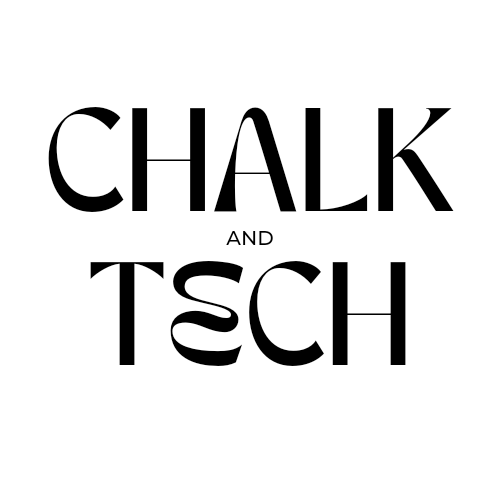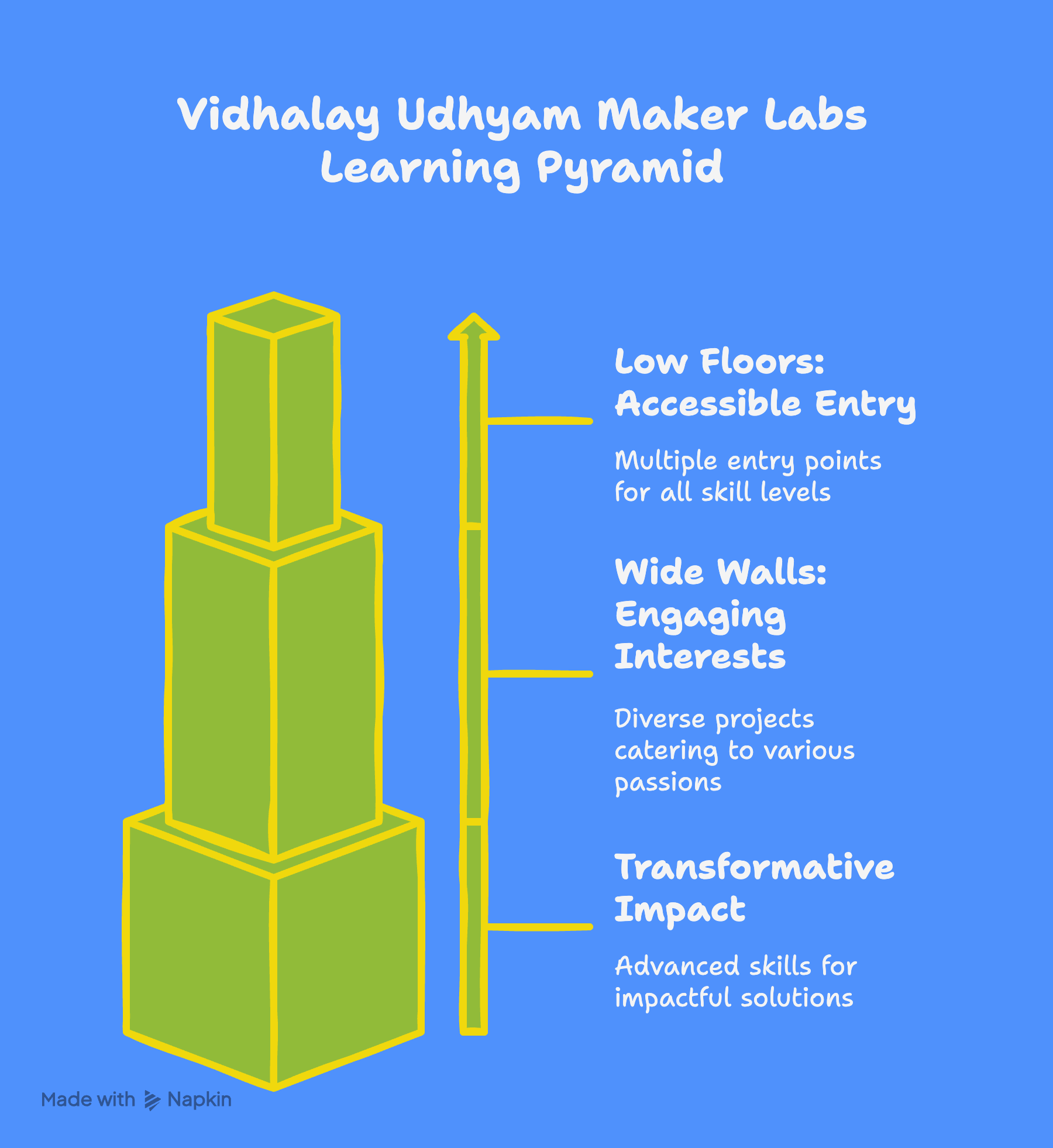Closing the Digital Divide: Tech Maker Spaces for India’s Tribal and Rural Girls
Read time: 8 mins
⏰ Only have a minute? View this 30 second comic strip.
Prachi, a Vidhyalay Udhyam Association (VUA) student for over two years, showcases her solar security light built for use in her village. This motion-detector device automatically turns on for 40 seconds when movement is detected.
The Spark: From Varanasi Ghats to Engineering
Solutions to global challenges often emerge in unexpected places—like the staircases of Varanasi, the ancient riverfront steps that lead to the banks of the Ganges.
It was here that a 13-year-old boy, Ashwani Tiwari, driven by an insatiable curiosity to uncover how things worked, spent his afternoons dismantling discarded mobile phones and soldering broken circuit boards. With nimble hands and boundless imagination, he transformed electronic waste into functional gadgets, which he sold to city dwellers across Uttar Pradesh. This early interest in e-waste repurposing hinted at a future in innovation.
Ashwani Tiwari, Co-founder and Director Vidhyalay Udyham Association (VUA)
That early fascination eventually led him to study Electronics and Communication Engineering and earn a prestigious fellowship with Gandhi Fellowship by Piramal Foundation, deepening his understanding of technology education.
A Mission Unveiled: Reaching Rural and Tribal Girls
But it wasn’t until Tiwari returned to his roots—his home in Varanasi—that his journey truly came full circle, revealing a mission much larger than himself: bringing tech education to rural India. He founded Vidhyalay Udhyam Association to provide rural and tribal girls with the freedom to experiment, cultivate inquisitive thinking, and aspire beyond the confines of socio-cultural norms.
The digital divide in India disproportionately affects tribal and rural girls; many lack access to electricity, the internet, or personal devices. According to the Census 2011, the literacy rate for Scheduled Tribes was 59%, significantly lower than the national average of 74.04%, and the gap is even wider for women and girls at 49.35%.
This technological isolation restricts their opportunities to develop crucial digital literacy and digital skills needed for the modern world. VUA’s Maker Labs are designed as a direct response to these systemic inequities, creating safe and accessible spaces where these barriers can be dismantled and technology can empower women in India.
Vidhyalay Udhyam's mission directly confronts the deep-seated challenges faced by tribal girls in India. These girls, often from marginalised communities, navigate a complex landscape of discrimination rooted in gender, poverty, and caste/tribal identity. Access to basic education is often limited, with many facing barriers like poverty, lack of nearby schools, safety concerns, and societal norms that devalue their schooling compared to boys.
Tangible Impact: Transforming Lives and Communities
Impact of the VUA Maker Labs.
Today, these girls are dismantling barriers, across a network of 15 Maker Labs over 6000 students annually in Delhi, Noida, and Udaipur. These spaces are tackling the intersectional inequalities of geography, gender, and poverty, unique to Scheduled Castes and Scheduled Tribes in India, providing crucial education access India.
Socio-economic impact of the VUA Maker Labs on India’s rural and tribal girls.
Building Trust: A Community-Rooted Approach
Getting girls into Maker Labs isn’t just about opening doors—it’s about tearing down walls. Deep-rooted prejudices, socio-cultural biases, and systemic inequities have long dictated what girls in rural India can and cannot do. For Tiwari and his team, it took three years to get the first cohort of 40 tribal girls into a Maker Lab in Jhadol village.
Girls from a KGBV school in a VUA Maker Lab. KGBV’s (Kasturba Gandhi Balika Vidyalaya are residential school schemes in India aimed at providing quality education to girls from disadvantaged communities.
Their approach was radical in its simplicity: build innovation spaces rooted in the community’s assets, rather than its challenges. Schools, parents, local government and village elders became part of the solution. Through genuine relationship-building and fostering mutual trust, they positioned local stakeholders as equal partners in establishing the Maker Labs. In 36 months, the Vidhyalay Udhyam team was able to transform scepticism into support, making the community their strongest advocates for rural education and technology integration.
Igniting Curiosity: Inquiry-Based Learning in Action
The Maker Labs emphasise inquiry-based learning, an approach that fosters curiosity and critical thinking, key components of effective tech education. It encourages individuals to ask questions, experiment, fail, find solutions, and deeply engage with problem-solving. In these spaces, tribal girls began challenging deeply ingrained beliefs.
VUA’s Maker Lab in session.
Science, logic, and reason gradually broke down the barriers they had been taught to accept. They started asking questions like, “Why does my menstrual cycle mean I can’t go to school?” and “Why must I marry at 16? Couldn’t I finish school, build a business?” As they imagined new possibilities through technology education, they realised, “I can achieve just as much as the boy next to me.”
The Maker Lab Model: Small Space, Big Vision for Rural Tech Education
VUA Maker Lab transforms existing spaces into hubs of creativity to drive rural tech education.
Setting up a Maker Lab requires just a small space, a few tools, and a big vision. These labs, often set up in unused schoolrooms or community centers, transform what’s already available—like idle science kits and second-hand monitors—into hubs of creativity and rural tech education. The cost? Around $1,500 (₹125,000), translating to a low-cost Makerspace setup, just $1.25 per student for a school population of approximately 1,500.
A student in Udaipur, Rajasthan at VUA’s physical computing workshop.
This modest budget covers essentials like Raspberry Pi devices, second-hand monitors, HDMI cables, CNC machines, sewing machines, basic mechanical and electronic components and locally sourced materials, facilitating hands-on STEM education India.
Powering the Labs: Local Youth as Educators
But the success of a Maker Lab isn’t just about equipment—it’s about people. Local youth aged 17–19 are trained as educators, turning the initiative into a grassroots tech India effort. These young facilitators, often students themselves, become the backbone of the labs. Over time, they guide younger students and help sustain the program, ensuring its impact ripples through the community and promotes digital literacy India.
For six hours a week, students immerse themselves in hands-on problem-solving. They code games in Scratch, program hardware, and tackle real-world challenges. From AI and drones to solar engineering and wood crafting, the curriculum adapts to local needs while introducing global ideas, offering a comprehensive technology education India.
The Three Pillars: Accessible, Engaging, Transformative Curriculum
VUA’s learning pyramid built on low floors, wide walls and high ceilings.
At the core of Maker Labs is a curriculum built on three guiding principles: low floors, wide walls, and high ceilings. These principles make learning inclusive, exciting, and capable of turning ideas into impactful solutions for tribal girls education.
Click the + below to learn more about each pillar
-
Available to everyone, no matter their current skills. You can start at any level, from beginner (like Scratch) to more advanced (like Python). The program is designed so you can always learn more and keep moving forward in your tech journey.
-
Diverse projects let students connect any interest to tech. From fashion design in Scratch to mobile apps, there's something for everyone, fostering engagement and exploration.
-
Pushes students to think big, empowering them to scale their ideas from basics to complex challenges. Starting with tools like the Raspberry Pi, they develop advanced digital skills to engineer solutions to local problems, fostering real-world impact. text goes here
Scaling the Vision: Challenges and Opportunities in Rural Tech Education
Scaling Maker Labs across diverse geographies presents a core challenge: balancing quality with accessibility. Rural, tribal, and urban students each have unique needs and learning styles, and adapting curricula to meet these differences without diluting educational standards is no simple task in rural tech education.
Systemic inefficiencies add another barrier. In many schools, millions of dollars worth of state-provided resources—science kits and computers—remain unused. The lack of training and maintenance leaves these tools dormant. Reviving them with proper support could unlock new opportunities for innovation and learning.
Government funding alone isn’t enough to sustain these labs. Collaborations with corporate and educational partners are crucial. These partnerships provide necessary resources and mentorship while local governments must ensure the infrastructure and curriculum are adapted to regional needs. VUA received generous support from Asia Initiatives, Assist International, Rise Up, EMPOWER, and NSRCEL – IIM Bangalore for this non-profit tech education initiative.
Ultimately, quality education is the key differentiator. To achieve real change, Maker Labs must focus on underserved rural and tribal areas, designing a curriculum that empowers students to innovate and problem-solve. Without quality tech education, these communities remain stagnated, and the transformative potential of Maker Labs will never be fully realised.
Slow is Fast: A Philosophy for Sustainable Change
When I asked Tiwari what message he wanted to convey, he responded,
“Slow is fast when it comes to driving social change in communities.” True transformation, he explained, happens incrementally—one shifted mind-set, one attitude, one successful experiment at a time. Over time, these small steps dismantle deeply ingrained misconceptions about a girl’s role in society, a core goal of empowering girls India. His approach to building Maker spaces is a testament to this philosophy: “Start with what you have, and build up from there.”
This pragmatic approach not only ensures sustainability but also highlights the importance of scalability, adaptability, and maximising existing resources in creating lasting impact through grassroots innovation.
Ashwani Tiwari and the tribal and rural girls of India are not just building tools; they are building a powerful counter-narrative to what’s possible when innovation starts at the grassroots and is culturally inclusive. Their story challenges us all to rethink where true technological progress originates, whose hands are most capable of shaping a better future, and how local ingenuity holds the key to global challenges.










